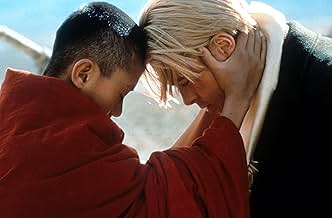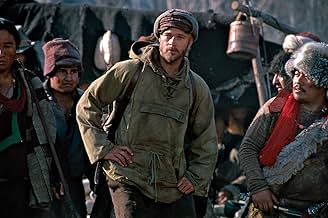A verdadeira história de Henrich Harrer, um alpinista austríaco que se tornou amigo do Dalai Lama durante a ocupação chinesa do Tibete.A verdadeira história de Henrich Harrer, um alpinista austríaco que se tornou amigo do Dalai Lama durante a ocupação chinesa do Tibete.A verdadeira história de Henrich Harrer, um alpinista austríaco que se tornou amigo do Dalai Lama durante a ocupação chinesa do Tibete.
- Direção
- Roteiristas
- Artistas
- Prêmios
- 3 vitórias e 8 indicações no total
BD Wong
- Ngawang Jigme
- (as B.D. Wong)
Ngawang Chojor
- Lord Chamberlain
- (as Ven. Ngawang Chojor)
- Direção
- Roteiristas
- Elenco e equipe completos
- Produção, bilheteria e muito mais no IMDbPro
Avaliações em destaque
I missed this film the fist time around and saw it for the first time last night on DVD. I was pleasantly surprised. It seemed to me that some extraordinary effort went into creating an accurate portrayal of the forbidden city of Lhasa, and the lives and culture of the Tibetans who are at the core of the movie.
On the acting side, Brad Pitt was not quite totally believable as a German but, accent-quibbles aside, he did inhabit the character in a way that was compelling and interesting. I thought the supporting cast of Mako and (mostly) Tibetan unknowns was good and the use of these unknowns added credibility to the movie.
The scenery was as beautiful as you would expect it to be -- breathtaking shots of the Himalayas dominating throughout much of the movie.
On the acting side, Brad Pitt was not quite totally believable as a German but, accent-quibbles aside, he did inhabit the character in a way that was compelling and interesting. I thought the supporting cast of Mako and (mostly) Tibetan unknowns was good and the use of these unknowns added credibility to the movie.
The scenery was as beautiful as you would expect it to be -- breathtaking shots of the Himalayas dominating throughout much of the movie.
This is a visually and emotionally impressive film, with a fine lead performance by the versatile Brad Pitt and an amazing performance by the young Tibetan Jamyang Jamtsho Wangchuk, who plays the Dalai Lama aged 14 (and whose younger brother apparently played the Dalai Lama aged 8). The film is very beautiful to look at, and the Buddhist atmosphere is convincing, with a great deal of attention to ritual detail from a Tibetan production adviser. But the film raises many disturbing questions and doubts. I have not read the book, but the consensus of opinion from several reviewers seems to be that this film is highly inaccurate and that many incidents are entirely made up by the screenwriters. However, I am more troubled by the Nazi issue. Heinrich Harrer was a member of the SS, and although he is admitted in some sources to have been a sergeant, he may well really have been a commissioned officer. In the film it is admitted that Harrer was a committed Nazi when he was in Austria, which is very honest, but nothing is mentioned about the SS or that he would therefore have been under SS military orders when he went to Tibet (indeed, he could not have gone in any other capacity, since he was in the SS and had met Hitler). Harrer's internment by the British in India during the War was thus not of an ordinary harmless Austrian mountain climber but of a soldier of the SS, which was a very serious matter in wartime, and the film glosses over this entirely. Instead, Harrer is made to appear an unjustly imprisoned man, which is very far from the truth. Few viewers of this film can possibly be expected to know of the Nazi obsession with Tibet or the reasons for it. Nor is the depiction of Tibetan Buddhism as a wholly good institution accurate. The true facts are very different. There were thousands of monasteries in Tibet and some contained 'good guys' and some contained 'bad guys', to put it in its simplest terms. There were sects of Tibetan monks, doubtless a small minority, who were 'on the left hand path' and involved in black magic. They were sometimes called 'the Yellow Hats' by the Nazis. People like the Dalai Lama, who hate things like black magic and believe in love and gentleness, were strongly opposed to them. In other words, Tibetan Buddhism was anything but uniform, it was diverse. Hundreds of 'Yellow Hat' lamas went to Germany during the 1930s and 1940s, and three hundred of them committed ritual suicide in Berlin just as the Russians were invading the City at the end of the War, and their bodies were found all lying in rows not far from Hitler's bunker. These 'evil lamas' were in league with Hitler, and were controlled through the SS, of which Harrer was a member. It was their 'job' to use their spiritual black magic powers to help the Nazis win the War, and Hitler became annoyed with them at the end because he believed they had failed him and that their mystical powers had been ineffective. The Nazis believed all kinds of crazy things, and the SS was the occult core of the Nazi movement, with its head, Heinrich Himmler, being totally obsessed by such matters, including his Tibetan lamas. Among the bizarre beliefs of the Nazis was that there were 'secret chiefs', hidden spirits of gigantic, super-human size, in command of the dark forces, who resided in deep caves beneath the Himalayas. The Nazis sent various expeditions to Tibet in the 1930s, and some of them were received in Lhasa, or at other places which were friendlier than Lhasa. So it seems that Harrer was somewhat less than candid in what he revealed about this, and that the film in turn is even more obfuscating on the issue. Probably it is true that Harrer really did reject his Nazi past after his years in Tibet, but although admitting to a Nazi past to a certain extent, there was no advantage to him, and indeed there was considerable personal danger, in giving any fuller details. After all, his former colleagues would certainly have taken reprisals against him if he had told the true full story about SS penetration of Tibet. It was acknowledged at the top of the Nazi leadership by such occult fanatics as Himmler and Hess that Hitler was being inspired, perhaps even manipulated, by the primaeval 'dark powers' who resided beneath the mountains of Tibet and who would grant the Nazis dominion over the whole earth if they received enough blood sacrifices. The real reason why millions of people were killed in the gas chambers, by no means all of whom were Jews, was not a simplistic anti-Semitism at all (though that was put about for mass consumption, and the anti-Semitism was real enough), but was as a black magic 'blood sacrifice' to the 'dark powers' in Tibet. Hitler and Himmler believed that if they fed the evil spirits inhabiting the caverns beneath Tibet with the souls of millions of humans, the evil spirits would then grant them rule over the earth as their representatives, and at the same time they would be 'making a New Man' of pure Aryan blood. The SS leadership celebrated black masses and many strange sexual rituals and performed human sacrifices. Himmler was the Grand Master and he and his twelve chief subordinate initiates actually worshiped Satan at Schloss Wewelsburg. Concealing the truth about Harrer's original SS membership does no one any good. Indeed, the contrast between Harrer's true SS past, as opposed to the sanitized version of it which says he was merely a Nazi sympathizer, and his later attitudes does him far more credit than he has ever received. Maybe we should look at it that way, and not be too starry-eyed about Germans in Tibet in the 1930s.
A movie is by definition a fictional tale. It may be based - more or less loosely - on real events, but it is still a fiction.
This part seems to have escaped many "reviewers" as it always does when a movie is based on "real events". In real life there are long periods when nothing exciting or interesting happens, but a movie cannot follow a character 24/7 in his daily life, even if that life takes place in Tibet.
This story is very loosely based on the experience of Austrian climber Heinrich Harrer, who embarked on a climbing expedition on the brink on WWII and ended up as POW in a British camp in India, for most of the war.
Having no reason to go back to Austria, he then ended up in Tibet where he met and became tutor to the 14th Dalai Lama. His adventure ended with the Chinese invasion of Tibet. That's it and it is already quite a lot.
The plot is a journey of discovery, not only geographical but also psychological. Thanks to his experience, Harrer turns from selfish, arrogant and uncaring into a gentler human being.
According to those who read Harrer account of his story, the film takes a lot of liberties, inventing episodes that - for me - are just supposed to make the story more cohesive. Also, I did not care much about Harrer involvement with the Nazi party, for which he apologised and that clearly was not the core of his existence.
Finally, for those who protest because the movie does not explore Tibetan culture, once more this is based on Harrer's tale, from is point of view. You want to know Tibetan history and Buddhist culture? There are thousand of non-fictional books and documentaries to fulfil this purpose.
This part seems to have escaped many "reviewers" as it always does when a movie is based on "real events". In real life there are long periods when nothing exciting or interesting happens, but a movie cannot follow a character 24/7 in his daily life, even if that life takes place in Tibet.
This story is very loosely based on the experience of Austrian climber Heinrich Harrer, who embarked on a climbing expedition on the brink on WWII and ended up as POW in a British camp in India, for most of the war.
Having no reason to go back to Austria, he then ended up in Tibet where he met and became tutor to the 14th Dalai Lama. His adventure ended with the Chinese invasion of Tibet. That's it and it is already quite a lot.
The plot is a journey of discovery, not only geographical but also psychological. Thanks to his experience, Harrer turns from selfish, arrogant and uncaring into a gentler human being.
According to those who read Harrer account of his story, the film takes a lot of liberties, inventing episodes that - for me - are just supposed to make the story more cohesive. Also, I did not care much about Harrer involvement with the Nazi party, for which he apologised and that clearly was not the core of his existence.
Finally, for those who protest because the movie does not explore Tibetan culture, once more this is based on Harrer's tale, from is point of view. You want to know Tibetan history and Buddhist culture? There are thousand of non-fictional books and documentaries to fulfil this purpose.
It's too bad that the movie had to be 139 minutes long. It's not that I can't handle movies that are that long, but when watching longer movies, I expect that it has something to say during that extra time and that's where it sometimes went wrong with "Seven Years in Tibet". It just seemed to keep dragging on forever without contributing to the story.
It needs about 2/3 of the time to show what a bad guy Heinrich Harrer actually is and only 1/3 of the time to show how he changes and gradually becomes a good man. All he thinks about is his career as a mountain climber. In 1939, just before World War II, his wife is pregnant with their first child. Harrer doesn't want to take up his responsibility and 'flees' from her by going to Tibet, where he will try to conquer Mount Nanga Parbat in the Himalayas. Because he is an Austrian and because the Nazi's already have taken over power in Austria, they will use his successes to prove that the Germans are the best race (I hope I don't have to explain the entire Nazi ideology to you, but that you paid enough attention during history class). During his attempt to reach the summit he is arrested by the British and taken to a POW-camp. After several attempts to escape he finally succeeds and together with Peter Aufschnaiter he succeeds to reach Tibet. First he is his old, bad self, but gradually he changes his lifestyle and becomes more 'Tibetan'. He even knows to get the attention of the very young Dalai Lama and becomes friends with him during the period that the Chinese took over power in Tibet.
I don't know if all that is shown in this movie actually happened or to which extent some parts have been made up. Of course it is all a bit politically 'colored' (the Tibetan question is still not solved until today and so there will always be people who will choose China's side and say that what is shown here is completely wrong), but that doesn't mean that this movie doesn't carry a powerful message. But even without this message of being a good husband and not being a career driven jerk, the philosophical Tibetan approach to problems... this movie is very nice eye candy. The landscapes are absolutely stunning and Tibet really looks like a place that certainly is worth a visit. The acting is very good and it all looks very believable.
So despite the fact that this movie dragged on from time to time and that it should have been a bit shorter, this still is a very nice film. I give it a 7/10, perhaps even a 7.5/10.
It needs about 2/3 of the time to show what a bad guy Heinrich Harrer actually is and only 1/3 of the time to show how he changes and gradually becomes a good man. All he thinks about is his career as a mountain climber. In 1939, just before World War II, his wife is pregnant with their first child. Harrer doesn't want to take up his responsibility and 'flees' from her by going to Tibet, where he will try to conquer Mount Nanga Parbat in the Himalayas. Because he is an Austrian and because the Nazi's already have taken over power in Austria, they will use his successes to prove that the Germans are the best race (I hope I don't have to explain the entire Nazi ideology to you, but that you paid enough attention during history class). During his attempt to reach the summit he is arrested by the British and taken to a POW-camp. After several attempts to escape he finally succeeds and together with Peter Aufschnaiter he succeeds to reach Tibet. First he is his old, bad self, but gradually he changes his lifestyle and becomes more 'Tibetan'. He even knows to get the attention of the very young Dalai Lama and becomes friends with him during the period that the Chinese took over power in Tibet.
I don't know if all that is shown in this movie actually happened or to which extent some parts have been made up. Of course it is all a bit politically 'colored' (the Tibetan question is still not solved until today and so there will always be people who will choose China's side and say that what is shown here is completely wrong), but that doesn't mean that this movie doesn't carry a powerful message. But even without this message of being a good husband and not being a career driven jerk, the philosophical Tibetan approach to problems... this movie is very nice eye candy. The landscapes are absolutely stunning and Tibet really looks like a place that certainly is worth a visit. The acting is very good and it all looks very believable.
So despite the fact that this movie dragged on from time to time and that it should have been a bit shorter, this still is a very nice film. I give it a 7/10, perhaps even a 7.5/10.
Personally, I find it hard to believe this movie is rated so lowly. It is at least a 7.5 in my books. Its far from perfect, but how many films out there actually question your beliefs and your actions and allows you to reflect on how you can live your life better? How many films make you want to know more about the film, the location, the people, the characters? Trust me, this film will make you more inquisitive and curious and probably open your eyes to the world beyond your borders.
Again, it is far from perfect, but watch it and try to see where I'm coming from. If you do not share my sentiments then, at least Brad Pitt's excellent acting and the gorgeous cinematography will keep your interest.
Again, it is far from perfect, but watch it and try to see where I'm coming from. If you do not share my sentiments then, at least Brad Pitt's excellent acting and the gorgeous cinematography will keep your interest.
Você sabia?
- CuriosidadesJetsun Pema is the real-life sister of The Dalai Lama. In this film she plays the mother of The Dalai Lama and hence her own mother.
- Erros de gravaçãoThe movie depicts the Dalai Lama's coronation occurring after Germany surrenders in WWII and after China invades Tibet. The actual enthronement ceremony took place on 22 February 1940, (Iron-Dragon Year, 1st month, 14th day), long before the end of the war and the Chinese invasion. On 17 November 1950, the Dalai Lama assumed full temporal (political) power over Tibet which was more than 10 years after his enthronement ceremony.
- Citações
Dalai Lama: We have a saying in Tibet: If a problem can be solved there is no use worrying about it. If it can't be solved, worrying will do no good.
- Cenas durante ou pós-créditosAs the end credits roll, a view of the mountains of Tibet is seen.
- Trilhas sonorasPurification Et Benediction
Performed by Monks of Namgyal Monastere
Principais escolhas
Faça login para avaliar e ver a lista de recomendações personalizadas
Detalhes
- Data de lançamento
- País de origem
- Central de atendimento oficial
- Idiomas
- Também conhecido como
- Siete Años en el Tíbet
- Locações de filme
- Empresas de produção
- Consulte mais créditos da empresa na IMDbPro
Bilheteria
- Orçamento
- US$ 70.000.000 (estimativa)
- Faturamento bruto nos EUA e Canadá
- US$ 37.957.682
- Fim de semana de estreia nos EUA e Canadá
- US$ 10.020.378
- 12 de out. de 1997
- Faturamento bruto mundial
- US$ 131.457.682
- Tempo de duração2 horas 16 minutos
- Cor
- Mixagem de som
- Proporção
- 2.39 : 1
Contribua para esta página
Sugerir uma alteração ou adicionar conteúdo ausente




































